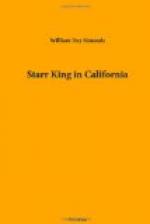humiliation to the Nation. They demanded his
immediate resignation. Let it be noted clearly
that Broderick was condemned, not for opposing negro
slavery, but simply and solely for opposing the extreme
southern contention. Not long, however, was Broderick
permitted to display his antislavery sympathies.
During the exciting campaign of 1859, David S. Terry,
believing himself aggrieved because of certain utterances
of Broderick, challenged the latter to deadly combat.
Reluctantly, but thereto compelled by long usage in
California, Broderick met Terry upon the so-called
“field of honor,” September 13, 1859.
Three days later Broderick was dead, a sacrifice, so
all forward-looking men believed, to the wrath of the
slave power. “His death was a political
necessity, poorly veiled beneath the guise of a private
quarrel.” This was said at his funeral,
and widely accepted among the people. It has
been claimed that the death of Broderick saved California
to the Union; that the revulsion of feeling following
his bloody death was so great that his beloved State
became good soil for the new teaching of Lincoln and
the Republican Party. Generously one would like
to accept this theory were not the evidence so strongly
against it. To Broderick belongs the high honor
of inaugurating the fight on the Pacific Coast against
the extension of slavery. In the outset of that
conflict he perished, and the manner of his taking
off gave to his message something of the force of
martyrdom. But not to the extent his admirers
have imagined. It should be clearly noted that
Broderick believed in local self-government regarding
slavery. He believed that the people of Kansas,
and the people of Virginia (as of all other states)
possessed the right under our national constitution,
of deciding this question for themselves without let
or hindrance by the general government. Farther
than this he did not go. To the day of his death,
he was a loyal Douglas Democrat. It should be
further noted that in this last campaign of Broderick’s
life the pro-slavery Democracy swept the State, its
candidate for Governor being elected by a vote nearly
twice the combined vote of the Douglas and Republican
candidates: And, also, that a year after Broderick’s
death Abraham Lincoln polled only twenty-eight per
cent of the popular vote in California for President
of the United States. Whatever may have been the
influence of the Senator’s brave conflict in
Congress, or his untimely death, it is evident that
the crisis in California’s attitude toward the
Union had not yet arrived, that the hour in which
any man might change the course of events still lay
within the unknown future.




